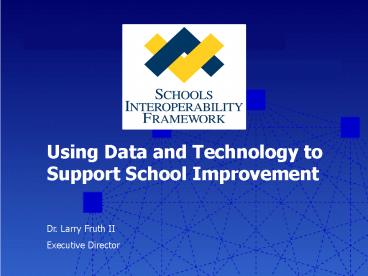Schools Interoperability Framework SIF - PowerPoint PPT Presentation
Title:
Schools Interoperability Framework SIF
Description:
want to be a part of 110,000 fans at a televised college football game? ... On January 8, 2002, President Bush signed into law the No Child Left Behind (NCLB) ... – PowerPoint PPT presentation
Number of Views:55
Avg rating:3.0/5.0
Title: Schools Interoperability Framework SIF
1
Using Data and Technology to Support School
Improvement Dr. Larry Fruth II Executive Director
2
The Challenge..
3
Ya Gotta Be There
What drives people to want to be a part of
110,000 fans at a televised college football
game? want to sit in driving rain and wind to
watch golfers pass you on one hole of a golf
course? sit in scorching sun with 1 million
others watching a religious service in a language
you do not speak? think coming to school is a ya
gotta be there? .. Impossible?
4
The Drivers I ..
On January 8, 2002, President Bush signed into
law the No Child Left Behind (NCLB) Act of 2001.
The Act outlined four basic education reform
principles stronger accountability for results,
increased flexibility and local control, expanded
options for parents, and an emphasis on teaching
methods that have been proven to work. Today
the driver is accountability demanded by end
users and consumers not just reporting!
5
What is Data Driven Decision Making?
To Students How am I doing? Educators How
are they doing? Administrators How are we
doing? State/Federal Where are we? Policy
Makers What needs addressed? Parents How is
he/she doing? Stakeholders What is the impact?
6
Expectations With Technology
To Students Increased Engagement Educators In
creased Tools/Info Administrators Increased
Accountability State/Federal Increased
Capabilities Policy Makers Increased
Efficiencies Parents Increased
Information Stakeholders Increased Output
7
Challenge Schools Traditional Setup
Cafeteria
SIS
?
?
?
Network Accounts
?
?
Library
Transportation
8
Horizontal Questions
Food Service
Grade Book
HR / Finance
Library
SIS
Transportation
Instructional Services
Voice Telephony
Accountability, Reporting, Planning, etc
Data Warehousing
9
(No Transcript)
10
The Drivers II..
USED National Educational Technology Plan -
Toward A New Golden Age In American
Education Action Step 7 Integrated Data Systems
Integrated, interoperable data systems are the
key to better allocation of resources, greater
management efficiency, and online and
technology-based assessments of student
performance that empower educators to transform
teaching and personalize instruction Recommendatio
n Ensure interoperability. For example
consider Schools Interoperability Framework (SIF)
Compliance Certification as a requirement in all
RFPs and purchasing decisions.
11
Why Standards? An ExampleSchools
Interoperability Framework
- Non-profit membership organization comprised of
- PK-12 Educational Technology Companies
- Regional Service Agencies
- Schools Districts
- U.S. and State Departments of Education
- Other educational organizations
- Jointly building the XML Specifications to
enableK-12 software applications to share data
quickly, dynamically and securely. - The SIF Implementation Specification is publicly
available on the SIF website. - Platform Independent / Vendor Neutral
12
SIF Components Working Together
Student Information Services
- Zone Integration Server (ZIS)
- SIF Agents
- Applications
- SIF Data Objects
Network Account
Library Automation
H.R. Finance
Food Services
Data Analysis Reporting
Grade Book
Instructional Services
13
The Result
- New Student Registering for Enrollment into
- Student Information System Directory Service
Application - ID Card System Library Automation System
- Cafeteria Management System
- Typical School SIF School
- - 49 minute task - 4 minute task
- - 10 times data entered - 1 time data entry
- 45 minutes/student X 18,000 students
- 6 FTEs!
- 1/10th the Time 1/10th the Risk
14
SIF School Benefits
- Students Parents
- Personalized Student Content
- Improved timeliness of service
- Accurate School Data
- Increased Efficiency
- IT Departments
- Reduced support costs
- Reduced time needed to manage multiple data
sources - Save money using existing systems and
infrastructure
Efficiency, Accuracy, Cost Savings
- Teachers
- Real-time access to critical information
- Better data analysis
- Teachers time better spent
- Administrators
- Increased Efficiency
- Reduced redundancy and errors
- Reduced compatibility issues
15
Vertical Interoperability
State
District
District
District
16
State Return on Investment
- Reallocation from State Reporting
- Eliminate 23 Aggregate Reports
- Reduce 8 hours per school per report
- Reduce hours per district per report
- 70,000 hours school staff time
- 18,000 hours district staff time
- 1,760,000 est. state report savings
17
What is SIFs current status?
- Over 250 members new added from each type each
week - Specification utilized to serve over 3 million
students, teachers and tech coordinators in 40
states - Legislatively mandated in one state 3 others
on the way - Demanded/suggested by USED, states and schools
in dozens current or planned state RFPs - Currently 50 certified applications - 1.5
testing new - Expanding from student/administrative data into
curriculum, content and other industry
verticals - 12-18 month focus on out of the box
interoperability and implementation support
18
Workshop Topics
- Organization of SIFA
- Implementation Success Stories LEA SEA
- Certification Overview and Importance
- Implementation Tools and Resources
- SIFA Future Directions
- Data Interoperability Discussion
- How to get involved and empowered!
19
Data Just Part of the Picture!
- The Big Picture
20
Why?
21
For More Information
- SIF websitewww.sifinfo.org
- Laurie Collins Larry Fruth, Ph.D.
- Project Strategist Executive Director
- lcollins_at_sifinfo.org lfruth_at_sifinfo.org
- Mark Reichert
- Chief Technical Officer
- mreichert_at_sifinfo.org































